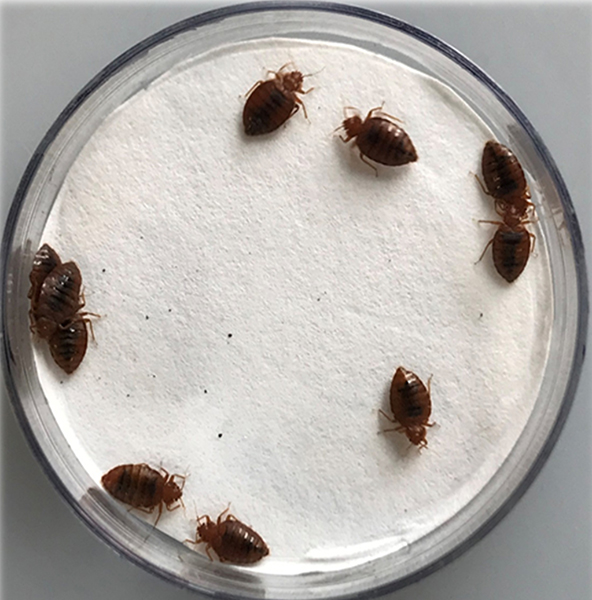Essential oils restore insecticide effectiveness against bed bugs
Bed bugs tuck themselves away into dark, unseen spaces and multiply rapidly, making them difficult to control. That job has gotten even harder in recent years as the pests have developed resistance to the insecticides long used to eradicate them from homes, hotel rooms and other spaces.
Plant-based essential oils are generally lethal to bed bugs, but it’s been unclear how to use them most effectively. Now, Purdue University entomologist Ameya Gondhalekar and his former Ph.D. student, Sudip Gaire, have discovered how essential oil compounds act on bed bug physiology and shown how they can improve the lethality of pyrethroids, a class of commercial and household insecticides.
Their findings were published in two papers in the journal Pesticide Biochemistry and Physiology — one released last year and another out this March.
“We’ve seen that we can kill resistant bed bugs with traditional pyrethroid insecticides, but we have to use increasingly larger amounts. Applying them at those levels is a problem,” said Gondhalekar, a research associate professor in entomology. “Our findings show that essential oils can kill bed bugs, but the combination of essential oils and pyrethroid insecticides has a synergistic effect.”
Gaire and Gondhalekar first tested the pyrethroid insecticide deltamethrin and a series of essential oil compounds on non-resistant bed bugs and a resistant Knoxville strain of bed bugs. A single dose of deltamethrin meant to kill 25% of bugs killed that many non-resistant bed bugs, but it took 70,000 times more to kill 25% of the Knoxville strain.
“Deltamethrin is so ineffective in the Knoxville strain of bed bugs that if you’re using it in the field even in large doses, you’ll get almost no control,” Gaire said.
The active ingredients in essential oils — thymol from thyme, carvacrol from oregano and thyme, eugenol from clove, and others — worked equally against resistant and non-resistant bugs. A dose meant to kill 25% killed that many of each type.
Gondhalekar said bugs’ nervous systems normally open and close sodium channels to pass signals through neurons. Deltamethrin binds to those sodium channels and keeps them open so that neurons cannot stop firing. That repeated firing quickly uses up the bug’s energy and kills it.
But resistant bed bugs possess multiple mechanisms to resist pyrethroids, including overactive levels of an enzyme called cytochrome P450, which degrades deltamethrin. The essential oil compounds, Gaire and Gondhalekar reported, bind to and deactivate that enzyme and allow deltamethrin to do its job on the bed bug’s nervous system.
Gaire and Gondhalekar combined a single dose of deltamethrin with a single dose of essential oil compounds that would be expected to kill 25 percent to 50 percent of the resistant bed bugs. Instead, it killed more than 90 percent of the resistant bed bugs.
“When we treated the resistant Knoxville bed bugs with different essential oils and tested for cytochrome P450, we found these enzymes were inhibited,” Gaire said. “The essential oil compounds were able to neutralize those enzymes, allowing the deltamethrin to do its job.”
Gondhalekar’s lab will continue researching potential formulations of essential oils with pyrethroid insecticides and test them in the lab and the field to maximize pest control. The Purdue University AgSEED program, the Center for Urban and Industrial Pest Management and the Bilsland Dissertation Fellowship supported this research as a part of Gaire’s dissertation.
 Bed bugs have become increasingly resistant to certain classes of synthetic pesticides. Purdue University researchers have uncovered mechanisms that make plant-based essential oils lethal for bed bugs especially in combination with synthetics, offering new options for control of this pest. (Photo courtesy of Sudip Gaire)
Bed bugs have become increasingly resistant to certain classes of synthetic pesticides. Purdue University researchers have uncovered mechanisms that make plant-based essential oils lethal for bed bugs especially in combination with synthetics, offering new options for control of this pest. (Photo courtesy of Sudip Gaire) 





